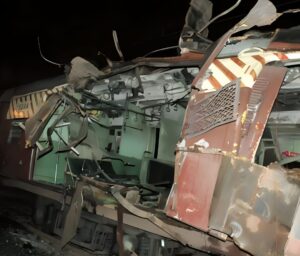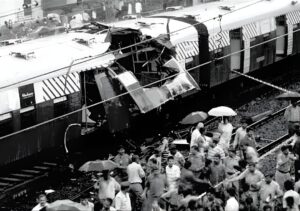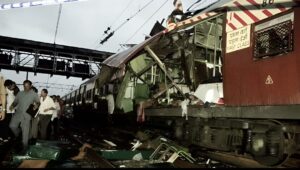On July 11, 2006, a series of seven bomb blasts struck Mumbai local trains within just 11 minutes, claiming the lives of 189 people.
Nineteen years after the devastating 2006 Mumbai Train Blasts that killed 189 people and injured over 800, the Bombay High Court has acquitted all 12 individuals previously convicted in the case. The blasts, which occurred on July 11, 2006, involved seven coordinated explosions aboard local trains, causing widespread panic and grief across the city.
In 2015, a special trial court had found the 12 accused guilty, sentencing five of them to death and the remaining seven to life imprisonment. The convictions were based on what was then presented as key evidence and testimonies linking the accused to the planning and execution of the attacks.
However, on Monday, the division bench of Justice Anil Kilor and Justice Shyam Chandak overturned the trial court’s verdict, ruling that the prosecution had “utterly failed” to establish the guilt of the accused beyond reasonable doubt. The court highlighted several inconsistencies and lapses in the investigation and prosecution’s case, leading to the decision to acquit all the convicts.
Bombay High Court Acquits All 12 in 2006 Mumbai Train Blasts , Citing Lack of Evidence

The judgment has sparked fresh debate over the handling of terror cases, the reliability of evidence, and the long delay in delivering justice. For now, all 12 former convicts are set to walk free nearly two decades after the tragedy.
Nearly two decades after the 2006 Mumbai Train Blasts that killed 189 people and injured over 800, the Bombay High Court has acquitted all 12 individuals who were convicted in connection with the case. In a major verdict delivered by a division bench of Justice Anil Kilor and Justice Shyam Chandak, the court ruled that the prosecution had “utterly failed” to prove the charges against the accused and observed that it was “hard to believe” they were involved in the crime. As a result, their convictions were quashed, and the court directed that they be released from jail if they are not wanted in any other case.
The court noted that the accused were given the “benefit of doubt” due to weak evidence, unreliable witness testimonies, and inconsistencies in the investigation. The judges questioned the reliability of witness statements, particularly pointing out that it was implausible for someone to recall the face of a suspect 100 days after the Mumbai Train Blasts . Furthermore, the court raised serious concerns over the credibility of the physical evidence presented. It stated that the explosives, arms, and maps recovered during the investigation appeared unrelated to the actual blasts. The prosecution, the court added, couldn’t even definitively establish what kind of bombs were used.

The devastating attacks Mumbai Train Blasts occurred on the evening of July 11, 2006, when seven coordinated blasts tore through first-class compartments of Mumbai’s suburban trains during peak hours. Rigged pressure cookers packed with explosives were used to maximize casualties. The blasts took place within an 11-minute span between 6:24 pm and 6:35 pm, targeting trains departing from Churchgate and exploding near major stations like Matunga Road, Mahim Junction, Bandra, Khar Road, Jogeshwari, Bhayandar, and Borivali.
In 2015, a special court under the Maharashtra Control of Organised Crime Act (MCOCA) convicted 12 individuals in the case. Five of them Faisal Sheikh, Asif Khan, Kamal Ansari, Ehtesham Siddiqui, and Naveed Khan were sentenced to death, while the remaining seven Mohammed Sajid Ansari, Mohammed Ali, Dr. Tanveer Ansari, Majid Shafi, Muzzammil Shaikh, Sohail Shaikh, and Zamir Shaikh received life sentences for conspiracy.
With Monday’s ruling, all 12 men are now set to walk free, closing a long and controversial chapter in one of Mumbai Train Blasts terror attacks.

